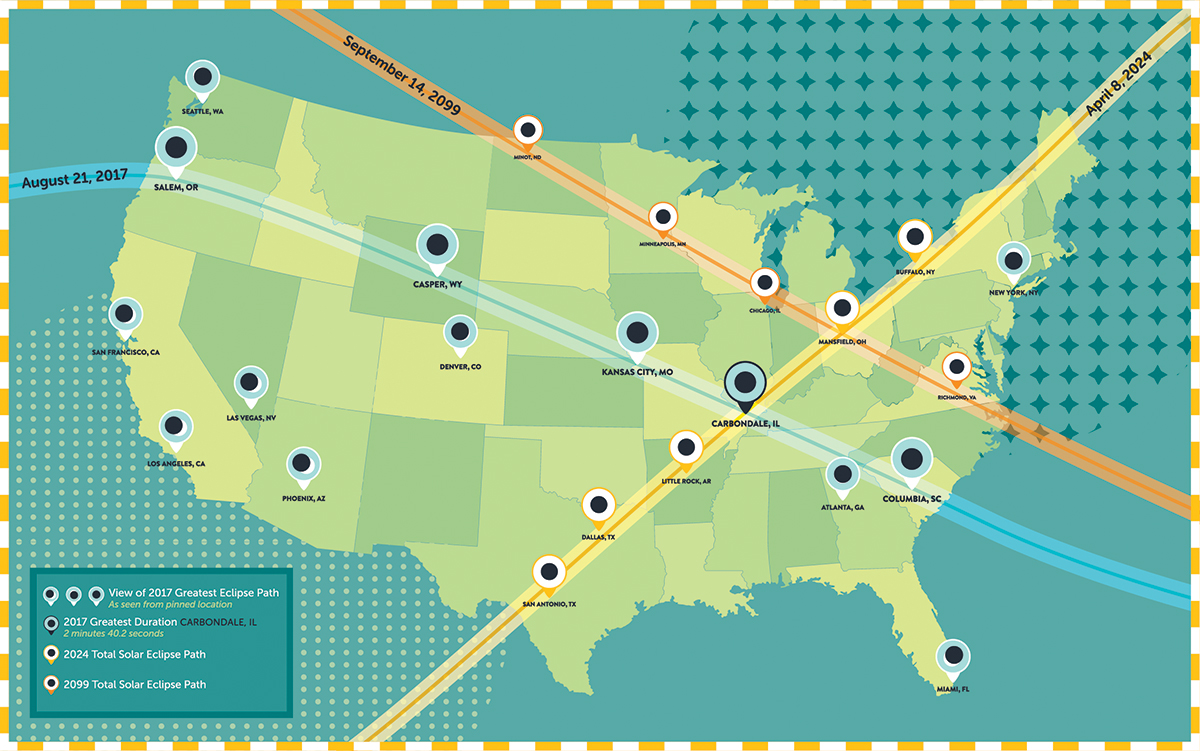On Monday, August 21, Chicagoans have a tough decision to make about how to take in the rare cosmic coincidence known as a solar eclipse. Should you head south to Carbondale, Illinois, where tens of thousands of people are expected to converge for the total solar eclipse—and watch as the entire sun disappears behind the moon? Or stay in the city, where about 10 percent of the sun will stay visible?
Here's what you need to know to make that choice.
Carbondale is one of the best places in the country to view it.
On the afternoon of the 21st, skygazers in Carbondale will witness a longer total eclipse—about 2 minutes and 40 seconds—than almost anyone else in the country. Considering this is one of the few eclipses where the "path of totality" (locations that can view the total eclipse) will cross the entire continental U.S., that's a big deal.
According to Mark Hammergren, an astronomer at the Adler Planetarium, it’s going to be an absolutely spectacular sight. “These events are so rare as seen from a given location on Earth, that the individuals who see this eclipse, they’ll be telling their grandchildren. It really is that dramatic a thing to witness,” he says.
You’ll get to see the elusive corona.
One reason for its splendor? A total solar eclipse reveals the diaphanous outer atmosphere of the sun—the corona, a “wispy, streaming” sight, says Hammergren. We normally can’t see the corona because, on most days, the sun’s bright surface renders it invisible to the human eye—like a whisper lost in the cacophony of a crowded room. It won't be visible from Chicago at all.
Some eerie stuff will go down.
Viewers of the total solar eclipse will find themselves in the darkness cast by the shadow of the moon—in Carbondale, for nearly three minutes. Stars and planets will shine in the sky in the middle of the day, according to Hammergren.
“The animals, of course, don’t know what’s going on,” he explains. “They think it’s nighttime. Birds will start going back to roost, cows will start heading back to the barns, the temperature will drop until the light from the sun returns, winds will pick up. It’s not just a static experience. It’s not just the picture in the sky. It’s everything that’s going around you.”
Chicago will miss out on these phenomena, not only because of the city’s lack of cows, but because the sun must be completely covered in order for them to occur. “The full experience really is only going to be visible in that path of totality,” Hammergren says.
Chicago will have its own eclipse-themed bash.
For those who don’t want to make the trip to Carbondale or other locations in the path of totality, witnessing the eclipse from Chicago will be less dramatic—but still very cool.
Adler Planetarium will be throwing a massive, all-day event to celebrate Chicago’s rare proximity to the celestial wonder, culminating, of course, with a group viewing of the eclipse that will start at about noon, according to Jennifer Howell, public relations manager at Adler. “We’re expecting up to 10,000 people,” Howell says. “It should be like a totally huge block party with science mixed into it.” In Chicago, the moon will cover about 87 percent of the sun.
It’ll get pretty crowded in Carbondale.
The downstate city (population: 26,179) is expecting about 55,000 visitors, according to Jannika Lopez, eclipse assistant coordinator at Carbondale Tourism. “If you wanted to just drive down for the Monday and drive back, we would advise you to give yourselves almost double the amount of time,” Lopez says.
Those who are considering spending the whole weekend in the southern part of the state might find themselves disappointed. As of Monday, there were only ten hotel rooms left in all of Carbondale, each going for about $499 per night—and camping space in nearby Shawnee National Forest is entirely booked.
And… you’ll have another chance soon.
If you can’t head downstate this time, another total solar eclipse will be visible from Carbondale in 2024. But if you’re waiting to get the total eclipse experience from Chicago, you’ll be waiting a long time. The next time the city will be in the path of a total solar eclipse? 2099.
Click on the map below to view a larger version.



